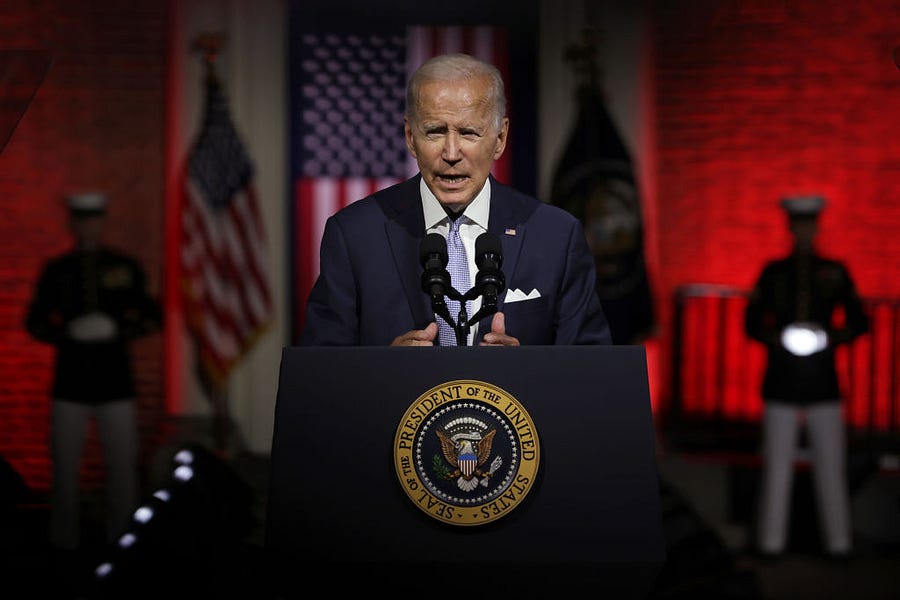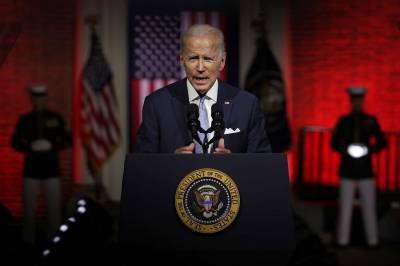Hello and happy Sunday. I don’t know how you spent your Friday evening, but if you weren’t watching Serena Williams’ U.S. Open match, you missed out. Williams, the greatest women’s tennis player of all time with 23 Grand Slam titles and $94 million in career prize-winnings, was playing in her final major. She lost in three sets to Australian Alja Tomljanovic, but she demonstrated incredible grit throughout the match and especially in the final game. Tomljanovic led 5-1 in the final set and had multiple opportunities to end the match, but Williams held her off for about 15 minutes.
Williams, 40, has not entirely ruled out playing the future, but she has shown she has nothing left to prove. She turned professional at the age of 14. She won her first major—the U.S. Open, coincidentally—when she was 17. In 2017, she won the Australian Open soon after learning she was pregnant. She has struggled with injuries in recent years, but her run through the U.S. Open—especially her final match—is a testament to her perseverance.
She’s not the only elder statesman of the sports world grabbing headlines this summer. Baseball has Albert Pujols. Pujols, 42 and a three-time MVP, returned to the St. Louis Cardinals, for whom he played for 11 seasons before free agency/trades took him to the Los Angeles Angels (then briefly the Dodgers), for his final season and he’s closing in on 700 home runs. Only three players—Babe Ruth, Hank Aaron, and Barry Bonds—have hit more.
In another example that made me feel especially old, Sports Illustrated featured LeBron James and his sons on the cover of this week’s issue. The gist of the article? James, 37, wants to hang out in the NBA long enough to play with Bronny and Bryce. (I’m old enough to remember LeBron himself being on the cover of SI when he was in high school.)
Maybe I’m going through a midlife crisis or I’m feeling nostalgic for my time as a sportswriter. But in our polarized times, with so many crises dominating the headlines, I think it’s worth it to step back to take a moment to appreciate greatness. Which—forgive the corny segue—is a big part of this newsletter’s purpose. And while I like to highlight the work of our hard-working younger reporters as often as I can, I’m going to kick off today’s summaries with a review of Biden’s speech by Jonah, our own example of someone at the top of his game despite his advanced age.
Having the right to do something doesn’t mean it’s the right thing to do. And, in our current terrible political moment, doing something wrong or ill-advised and justifying it on the grounds that your opponents did the same thing isn’t helping. In his Friday G-File, Jonah illustrates this in his analysis of President Biden’s primetime presidential address. As Jonah notes, such addresses are generally reserved for announcing a major policy or responding to significant events. On Thursday, Biden spoke from Independence Hall in Philadelphia, with Marines in the background, to discuss the “Soul of the Nation.” After opening by highlighting Independence Hall as the birthplace of the Declaration of Independence and the Constitution, he quickly turned to the point of speech, that “Donald Trump and the MAGA Republicans represent an extremism that threatens the very foundations of our republic,” he said. He slammed Trump supporters for not respecting the Constitution and the rule of law and wanting to take the country backwards. Then the speech evolved into a State of the Union-esque laundry list of his recent legislative accomplishments. In short, a fitting campaign speech but not what one thinks of as a primetime address. It met with immediate criticism for its naked partisanship, and the main response to that criticism was “Well Trump did it too.” Jonah’s not really having it. “This is the kind of garbage politics you get when everything is reduced to can rather than should,” he writes. “Your team did wrong and got away with it, so our team can now do wrong, but we’ll call it right because it’s our team doing it now. A morality that cites the authority of your enemies’ sins as proof of the same sins’ virtue when they’re yours is not, in fact, morality.”
Remember when Donald Trump tried to use emergency powers to build a southern border wall and there was bipartisan displeasure with the power grab? GOP Sen. Mike Lee proposed legislation to curtail emergency powers and several Democrats joined him. Andrew notes that Democrats have been at the forefront of similar efforts in the House. But now that Joe Biden has invoked emergency powers to wipe away hundreds of billions in student debt, Democrats have changed their tune. Andrew highlighted comments in support of debt relief from Reps. Adam Schiff, Peter DeFazio, Veronica Escobar and others, then notes: “It’s possible that these lawmakers decided there was no political incentive to rock the boat on a move they supported on the merits. After all, there’s nothing more they could do legislatively to prevent Biden from taking this unilateral action—one which, if Congress had gotten its act together and passed the bills they’ve been pushing for months ago, Biden might never have been able to take at all.”
In mid-August, two drones—which the U.S. government traced to Iranian-sponsored culprits in Iraq—hit a U.S. base in Syria. A week later, three U.S. servicemembers in Syria were injured in another strike launched by Iranian-backed forces. And just this week, Iran “attempted to commandeer an unmanned American maritime vessel in the Persian Gulf” and the Iranians and the U.S. have presented different explanations for how we got our drone back. Given these escalating tensions, why is it again that the Biden administration is trying to get Iran to agree to a new nuclear deal? Charlotte notes that Iran’s presence in Iraq and Syria presents multiple challenges. “Iran’s footholds in Syria and Iraq provide the country a staging ground for attacks on American troops and allied forces,” she writes. “All the while, Iranian negotiators see their strength across the region as leverage to push the U.S. toward more favorable terms in the impending nuclear deal.”
Here’s the best of the rest:
Donald Trump’s successful appeal to the working class has some Republicans thinking that the future of the party is populist. James Capretta argues that the GOP will never be able to out-populist the Democrats, and that party and country would both be better served by pushing back and promoting free trade and economic liberty.
In a similar vein, Scott Lincicome marks Labor Day by making the case in Capitolism (🔒) that free markets do a better job of providing opportunities and creating better conditions for workers than “pro-worker” policies advanced by the government.
With the Republicans’ hoped-for “red wave” in the midterms looking more like a “red ripple,” Haley notes in Uphill that slim majorities create more opportunities for individual members of the party in power. Given the dynamics of the GOP, she predicts headaches for House GOP leader Kevin McCarthy if he were to become speaker.
The investigation surrounding Donald Trump’s mishandling of classified documents prompted good questions around The Dispatch’s (virtual) watercooler: Who actually gets to classify and declassify information? When can the president do so? Price has the answers.
In Stirewaltisms (🔒), Chris writes that Biden and the Democrats have forgotten that they were elected to do one job, and one job only: not be Donald Trump. He argues that Biden should be happy to let Trump’s scandals dominate the news instead of trying to make news himself.
A busier week than normal on the pods: In addition to our usual weekly lineup, we dropped the latest episode of The Dispatch Book Club. Sarah and Harvest discuss Think Again: The Power of Knowing What You Don’t Know. Donald Trump keeps giving the Justice Department reasons to disclose new evidence against him, as the gang notes on The Dispatch Podcast. For the legal nerdery around the Trump investigation, check out Advisory Opinions. Jonah welcomes Katherine Mangu-Ward of Reason for a conversation on libertarian philosophy and the relationship between libertarianism and feminism. And on Good Faith, David and Curtis Chang dive into “time horizons” and how Christians should be playing the long game instead of getting caught up in issues of the moment.







Please note that we at The Dispatch hold ourselves, our work, and our commenters to a higher standard than other places on the internet. We welcome comments that foster genuine debate or discussion—including comments critical of us or our work—but responses that include ad hominem attacks on fellow Dispatch members or are intended to stoke fear and anger may be moderated.
With your membership, you only have the ability to comment on The Morning Dispatch articles. Consider upgrading to join the conversation everywhere.